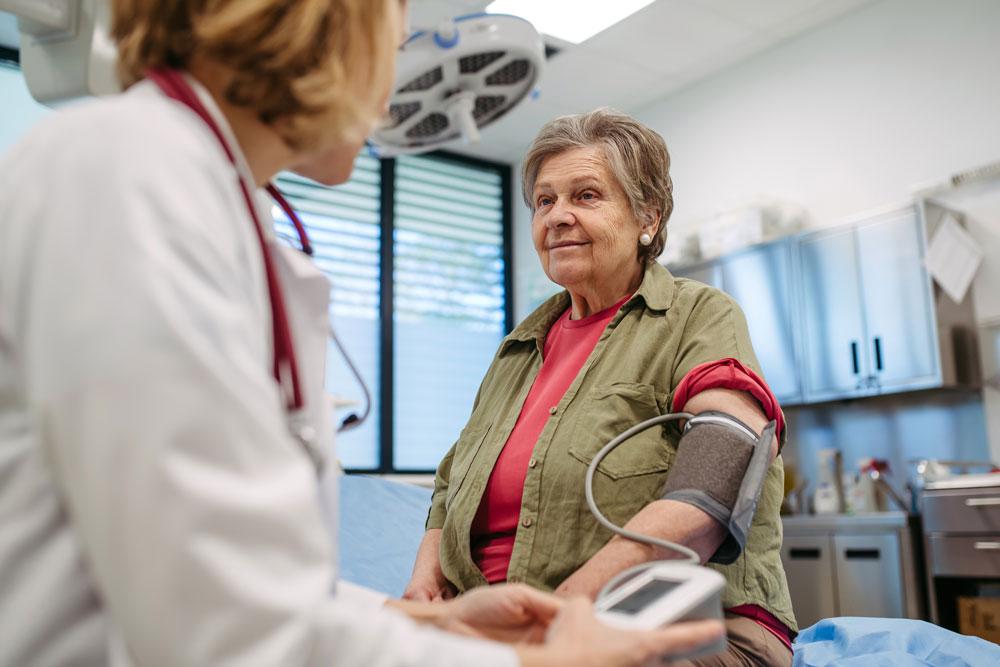Welcome to our first Health Business Top 50 NHS Professionals list - our pick of the people that have shaped the national health service over the years.
Now, perhaps more than at any other time in its history, our reliance on and gratitude towards the NHS has never been greater. The overwhelming pressures of the coronavirus pandemic have pushed the nation’s health workers to the brink, with the ongoing efforts to tackle the virus, and the new Omicron variant, expected to worsen again this winter.
Hospitals are treating more patients, with an ever increasing variation of illnesses, whilst operating under tighter infection prevention measures and shrinking budgets. The record funding, announced under Theresa May’s premiership, did not account for a global health disaster and the ‘kick it down the road’ attitude towards addressing the social care crisis leaves even more burdens on the doorstep of the country’s largest employer.
Nonetheless, the ability to provide the best care possible to all patients, no matter where they live in the country, remains unrivalled. Those that work for, within and alongside the NHS have rightly deserved our claps, our thanks and our ongoing appreciation.
Our first HB Top 50 NHS Professionals is our pick of the people that have made an impact on the health system in England. This includes government officials, hospital management, leadership within NHS representative organisations and so forth. Because of the coronavirus pandemic and the unscheduled disruption that has been caused, you will find that some on the list have gained prominence during the last few years, whilst others have seen the stress of the pandemic as the right time to take a step away from the profession they have served so brilliantly.
Undoubtedly, views will be varied. There are names that many readers will feel should be on the list that do not appear, as well as figures placed lower on the list than many think they deserve. It is our hope that these rankings will be reproduced regularly to accurately reflect the changing landscape of the healthcare sector.
Please join me in congratulating those on the list, as well as thanking all those who continue to work under the banner of our wonderful National Health Service.
1 - Sir Simon Stevens, former chief executive of NHS England
At the end of July, Sir Simon Stevens formally stepped down as chief executive of NHS England after more than seven years as it’s chief executive. Having first joined the NHS in 1988 through its graduate management programme, Stevens became head of the health service in April 2014 and has most notably led the NHS through the most testing period of its history. Prior to the coronavirus pandemic outbreak, Stevens also oversaw the development of the Five Year Forward View, the introduction of an NHS Workforce Race Equality Standard, a £20.5 billion funding boost to celebrate the NHS’ 70th Anniversary and the launch of the NHS Long Term Plan.
2 - Amanda Pritchard, chief executive of NHS England
Amanda Pritchard has been chief executive of NHS England since August 2021, having previously served as COO of the same organisation, as well as NHS Improvement, before replacing Stevens in the most senior role. As COO, Pritchard has overseen NHS operational performance and delivery, as well as implementation of service transformation and patient care improvements set out in the NHS Long Term Plan. Following the coronavirus pandemic, Pritchard will be responsible for an annual budget of more than £130 billion and says that the service’s successes over the last 18 months have meant that ‘we can face the future with confidence’.
3 - Sir James Mackey, chief executive Northumbria Healthcare
As part of a two year secondment as chief executive of NHS Improvement, which began in 2015, Sir James Mackey oversaw the creation of the organisation that has brought together NHS regulators Monitor and the Trust Development Authority. Responsible for overseeing NHS trusts, NHS Improvement supports providers to ensure patients are given consistently safe, high quality, compassionate care within local health systems that are financially sustainable. Prior to that role, and again since 2017, Mackey has been serving as chief executive of Northumbria Healthcare, an appointment which, at the time, made him one of the youngest chief executives of a hospital trust in England. Northumbria Healthcare is now widely recognised as one of the best NHS organisations in England for its high quality patient care.
4 - Sajid Javid, Secretary of State for Health and Social Care
Although only in the role since June, as Secretary of State for Health and Social Care, Sajid Javid is responsible for the overall financial control and oversight of NHS delivery and performance, as well as the oversight of social care policy from the Department of Health and Social Care. Upon becoming Health Secretary, Javid announced that he was in favour of an end to public health restrictions, brought about by the coronavirus pandemic, but warned the public that ‘we are going to have to learn to accept the existence of Covid and find ways to cope with it’. Alongside Prime Minister Boris Johnson, he announced that £36 billion will be invested in the health and care system over the next three years, to ensure it has the long term resource it needs.
5 - Danny Mortimer, chief executive of NHS Employers
Danny Mortimer has been chief executive of NHS Employers since 2014, leading work relating to workforce policy and practice, as well as being deputy chief executive of the NHS Confederation. Mortimer, who first worked in healthcare as a porter and CSV care assistant, worked in the NHS in Bath and Brighton before taking up his first director post for Royal West Sussex NHS Trust and Western Sussex PCT. He then worked in executive roles in hospitals in Hertfordshire and Nottingham before joining NHS Employers. As well as being a trustee of the Employers Network for Equality and Inclusion and the NHS Retirement Fellowship, Mortimer currently chairs the Cavendish Coalition of social care and health organisations.
6 - Emily Lawson, chief commercial officer of NHS England
Earlier this year it was announced that Emily Lawson would begin an open-ended secondment arrangement to lead Prime Minister Boris Johnson’s new delivery unit after drawing praise for her role as NHS England’s executive lead for the national vaccination programme. Since November 2020, Lawson has led the operational delivery of the Covid-19 vaccine across the NHS in England, responsible for ensuring that vaccine is rolled out in line with the vaccine prioritisation agenda set by the Joint Committee for Vaccination and Immunisation and in a way that ensures fair and equitable access.
7 - Stephen Powis, National Medical Director of NHS England
A familiar face from Downing Street’s coronavirus press briefings, Stephen Powis is the National Medical Director of NHS England and Professor of Renal Medicine at University College London. In his National Medical Director role he is the most senior doctor within the National Health Service in England. Before taking up his current role with NHS England in 2017, Powis was medical director of the Royal Free London NHS Foundation Trust and is a past non-executive director of North Middlesex University Hospital NHS Trust.
8 - Jeremy Hunt, chair of the Health and Social Care Select Committee
Jeremy Hunt is the current chair of the Health and Social Care Select Committee, a Commons Select Committee overseeing DHSC operations. Inquiries led by Hunt have examined the management of the coronavirus outbreak, lessons learnt from the pandemic and workforce burnout and resilience in the NHS and social care. Hunt was appointed Health Secretary in 2012, becoming the longest serving MP to hold the role in 2018. His length of service and success in securing £20bn in NHS investment prior to the NHS’s 70th Anniversary mean he is likely to be remembered fondly.
9 - Ruth May, Chief Nursing Officer
Ruth May took up the post of Chief Nursing Officer for England in January 2019, the most senior advisor on nursing matters in government, and before this enjoyed national appointments with NHS Improvement and Monitor as well as regional and trust leadership roles. More recently, she was appointed the national Covid-19 response lead for the nursing, midwifery and care professions in England. In 2019, NHS England set out her three key priorities as establishing a workforce that is fit for the future, renewing the reputation of the NHS profession for the future and creating a collective voice for nursing.
10 - Dame Jackie Daniel, chief executive of Newcastle Hospitals
Dame Jackie Daniel has been chief executive at Newcastle Hospitals since 2018, having previously held the same role at University Hospitals of Morecambe Bay NHS Foundation Trust, which she led out of special measures. Recognised in the Queen’s New Year’s Honours in 2017, Daniel began her NHS professional career as a nurse before moving into NHS management. Daniel has seen Newcastle Hospitals rated Outstanding for the second time in a row by the CQC, the largest NHS organisation to receive the accolade twice. She also chairs the Shelford Group, which represents the ten largest teaching and research hospitals in the NHS.
11 - Chris Hopson, chief executive NHS Providers
Chris Hopson was appointed as chief executive of NHS Providers in September 2012, a role which sees him act as the principal public voice of the organisation and represent the provider sector on a range of NHS system level committees. NHS Providers is the membership organisation for all of England’s 217 ambulance, community, hospital and mental health trusts.
12 - Claire Murdoch, National Director for Mental Health at NHS England
Claire Murdoch has more than 20 years NHS experience holding various clinical and managerial posts in inner London mental health services, including the inaugural chair of the Cavendish Square Group of the 10 London NHS trusts responsible for mental health services, and currently holds the position of chief executive at Central and North West London NHS Foundation Trust. Alongside this, Murdoch is national director for mental health at NHS England.
13 - Ian Dodge, executive director, NHS England
Ian Dodge has worked for NHS England since 2014, and currently has the portfolio responsibility of national director for strategy and innovation. In his 20 years working for the Department of Health, Dodge worked under ten different Secretaries of State. His current directorate leads the NHS’ work on strategy, sustainability and transformation, implementing the Five Year Forward View and giving power to patients through personalisation and choice.
14 - Chris Whitty, Chief Medical Officer for England
Head of the public health profession in England, Professor Chris Whitty is Chief Medical Officer and the government’s Chief Medical Adviser, as well a practising NHS Consultant Physician at University College London Hospitals. Since the start of the pandemic, Whitty has appeared in public information adverts on national television and led the social-distancing strategy to reduce the spread of the virus during the pandemic.
15 - Jonathan Ashworth, Shadow Secretary of State for Health and Social Care
Jonathan Ashworth became Shadow Secretary of State for Health in 2016, and took on the extra responsibility for social care in 2020. Serving under both Jeremy Corbyn and Sir Kier Starmer, Ashworth was praised by then Health Secretary Matt Hancock for his help devising government policy on the coronavirus pandemic. He has recently become Shadow Work and Pensions Secretary.
16 - Glen Burley, chief executive of South Warwickshire NHS Foundation Trust
A former director of Finance for South Warwickshire Mental Health Services NHS Trust, Glen Burley joined South Warwickshire in 2006, initially as interim chief executive, before his formal appointment two years later. Under his leadership, SWFT has moved through financial turnaround, achieved Foundation Trust status in 2010, completed the successful acquisition of Warwickshire Community Services in 2011 and gained Outstanding ratings for quality and use of resources in late 2019.
17 - Chaand Nagpaul, council chair of the British Medical Association
Chaand Nagpaul is a GP and senior partner in his practice in Stanmore, North London, where he has practised for 28 years. He was elected as chair of BMA council in July 2017, and has been a council member since 2008. In recent years Nagpaul campaigned against the immigration cap on overseas doctors from outside the European Union, argued against the proposal to privatise the NHS and stressed the urgency to tackle health inequalities as a means to improving population health outcomes in Britain.
18 - Robert Woolley, chief executive of University Hospitals Bristol and Weston NHS Foundation Trust
Robert Woolley was appointed chief executive of UHBW in 2010 and plans to leave the role in March. During his tenure, the organisation has moved from a rating of Requires Improvement straight to two successive ratings of Outstanding in 2017 and 2019 respectively. At the time, the trust was the first to be rated Outstanding by the CQC after a previous rating of Requires Improvement.
19 - Tracy Allen, chief executive of Derbyshire Community Health Services NHS Foundation Trust
Tracy Allen has been chief executive of Derbyshire Community Health Services NHS Foundation Trust since 2011, having led the creation of Derbyshire Community Health Services from the provider arms of six predecessor PCTs, its successful development into an APO and its establishment as a Community NHS Trust. Under Allen’s leadership, DCHS has achieved the highest Outstanding rating from the CQC.
20 - Sir Michael Deegan, chief executive of Manchester University NHS Foundation Trust
Michael Deegan has been chief executive of Central Manchester University Hospitals NHS FT since 2001, before the merger to Manchester University NHS FT in 2017. MFT is one of the UK’s largest acute trusts, running nine hospitals across six sites. At CMFT, Deegan oversaw the £520m PFI redevelopment of its Oxford Road campus; attained, in partnership with the University of Manchester, Biomedical Research Centre designation in 2008; and managed the transition to Foundation Trust status with effect from January 2009.
21 - Matthew Gould, CEO of NHSX
Having been the government’s Director General for Digital and Media Policy for three years, Matthew Gould was appointed CEO for NHSX in May 2019, the year in which the department was established. His main priority is the advancement of NHS and social care transformation, driven by technology, in line with the NHS Long Term Plan and the Secretary of State for Health and Social Care’s technology vision.
22 - Lord David Prior, chair of NHS England
A former MP, Lord Prior was chairman of Norfolk and Norwich University Hospitals NHS Foundation Trust from 2002-2012 before becoming chairman of the CQC. In 2015, he was appointed Parliamentary Under Secretary of State for Health and created a Life Peer, before becoming chairman of University College London Hospitals at the end of 2017.
23 - Ted Baker, Chief Inspector of Hospitals, Care Quality Commission
Having first joined the NHS in 1973, Ted Baker has enjoyed a career encompassing clinical and academic medicine and hospital management. Since 2017 he has held the position of the Chief Inspector of Hospitals at the Care Quality Commission, the independent regulator of health and social care in England, having previously held the Deputy Chief Inspector of Hospitals position for the three years prior.
24 - Nick Watts, Chief Sustainability Officer
Dr Nick Watts is the Chief Sustainability Officer of the NHS, responsible for its commitment to deliver a world-class net zero emission health service. Based in London, he leads the Greener NHS team across the country, which focuses on improving the health of patients and the public through a robust and accelerated response to climate change and the broader sustainability agenda.
25 - Julian Hartley, chief executive of Leeds Teaching Hospitals NHS Trust
Holding the role of chief executive since 2013, Julian Hartley has led the Leeds Teaching Hospitals NHS Trust to become the most improved acute trust in the country in the national staff survey across the board, showing significant improvements to staff engagement year on year. Hartley’s work is particular noticeable in the local area, introducing The Leeds Way and embedding the Leeds Improvement Method as a culture of continuous quality improvement. Hartley was asked by NHS Improvement to work on the national NHS People Plan.
26 - Rob Webster, West Yorkshire and Harrogate Health and Care Partnership
Earlier this year it was announced that Rob Webster would leave his post as chief executive of South West Yorkshire Partnership Foundation Trust to become the full-time lead of the West Yorkshire and Harrogate Health and Care Partnership. Webster joined South West Yorkshire Partnership Foundation Trust in May 2016 from NHS Confederation, where he was chief executive for over two years.
27 - Edward Argar, Minister for Health
Edward Argar was appointed Minister of State at the Department of Health and Social Care in September 2019, having first been elected as Conservative MP for Charnwood, Leicestershire, in 2015. Amongst other areas, the Minister of State for Health leads on NHS operational performance, NHS capital, land and estates, NHS England mandate, the NHS workforce and the Long Term Plan Bill.
28 - Matt Hancock, Conservative backbencher
Matt Hancock served as Health and Social Care Secretary between July 2018 and June 2021, encompassing the handling of the coronavirus pandemic and the vaccine rollout. At the end of 2018 he promised to introduce minimum technical standards that digital services in the NHS will have to meet, pledged to tackle the world’s largest collection of fax machines, and sought to end to non-disclosure agreements.
29 - Ian Trenholm, chief executive of the Care Quality Commission
Formerly chief executive of NHS Blood and Transplant from 2014-18, Ian Trenholm is the chief executive of the Care Quality Commission, the independent regulator of health and adult social care in England. Under his guidance, the CQC ensures that health and social care services provide people with safe, effective, compassionate, high-quality care and encourages care services to improve. His prior roles include chief executive of the Royal Borough of Windsor and COO at the Department of Environment Food and Rural Affairs.
30 - Michael Wilson, chief executive of Surrey and Sussex Healthcare NHS Trust
After serving 11 years as chief executive of SASH NHS Trust and 41 years in the NHS, Michael Wilson is stepping down this year. Under Wilson’s stewardship, SASH has been transformed from an organisation with significant challenges to one of the top performing NHS trusts in the country. SASH is regularly among the top performing NHS trusts in the national staff survey, is often in the top ten trusts in the country for ED waiting times and has delivered a financial surplus for many years.
31 - Dame Marianne Griffiths, chief executive of Western Sussex Hospitals NHS Foundation Trust
Dame Marianne Griffiths has led the Western Sussex Hospitals from its creation from a merger in 2009 to being awarded Foundation Trust status four years later and in 2019 becoming the first acute trust to be rated Outstanding in all five areas inspected by the CQC. She now leads UHSussex, which employs nearly 20,000 people across five main hospital sites in Sussex, with an operating budget of more than £1 billion.
32 - Tom Cahill, chief executive of Hertfordshire Partnership University Foundation Trust
Tom Cahill has been chief executive of Hertfordshire Partnership University Foundation Trust since 2009, and has overseen the development of new models of care, new facilities and the trust’s culture. Under his leadership, HPFT was rated as Outstanding by the CQC in 2019. He is stepping down from his role at the end of 2021.
33 - Stephen Posey, CEO of the Royal Papworth Hospital Foundation Trust
With more than two decades experience in the health service, Stephen Posey joined Royal Papworth Hospital NHS Foundation Trust as its chief executive in November 2016. Prior to this, Posey was the deputy chief executive at East and North Hertfordshire NHS Trust where he successfully delivered a £150 million investment programme to reconfigure acute services across East and North Hertfordshire.
34 - Tim Kendall, National Clinical Director for Mental Health, NHS England
Professor Tim Kendall is NHS England’s National Clinical Director for Mental Health, a role he has held since 2016, providing clinical advice and strategy in mental health across government and the NHS. He chairs a number of national committees to implement the Mental Health Five Year Forward View and The Long Term Plan.
35 - Martin Steele, chief executive officer of NHS Property Services
Martin Steele was appointed acting chief executive officer of NHS Property Services in April 2020. Particularly important during the current pandemic, Steele is responsible for overseeing the management and operations of NHSPS’ significant portfolio, which comprises over 3,500 properties with 7,000 customers across England, representing approximately 10 per cent of the total NHS estate.
36 - Joe Harrison, chief executive of Milton Keynes University Hospital NHS Foundation Trust
Professor Joe Harrison has been an NHS acute hospital chief executive for almost a decade. He joined Milton Keynes University Hospital in 2013, transforming its record in quality, performance and finances. Under his leadership the trust has gained teaching hospital status and pioneered digital advances that have revolutionised patient care and experience. He has championed NHS expansion, overseeing significant development across the hospital estate.
37 - Sean Duggan, chief executive of the Mental Health Network
Sean Duggan is dedicated to raising standards of care and treatment of mental health services and improving lives of those who use services and their carers, and has been chief executive of the NHS Confederation’s Mental Health Network since 2016. Duggan supports multi-sector service delivery and has ensured this is reflected in the network’s membership, which has grown to include independent and third sector organisations, including digital providers.
38 - Tracey Fletcher, chief executive of Homerton University Hospital NHS Foundation Trust
Tracey Fletcher became chief executive of Homerton University Hospital NHS Foundation Trust in 2013. She re-joined the trust in 2010 as COO and has extensive experience in health care management, having begun her career in a mental health trust followed by a community trust. Homerton University Hospital NHS Foundation Trust was rated Good by the CQC in its 2018 inspection, across all areas, with Homerton University Hospital rated as Outstanding.
39 - Angela Hillery, chief executive of Northamptonshire Healthcare NHS Foundation Trust
In 2019 Angela Hillery was appointed chief executive of Leicestershire Partnership Trust, in a shared role with the same position at Northamptonshire Healthcare NHS Foundation Trust, which she has held since 2013. In 2018, NHFT achieved an overall rating of Outstanding from the CQC, having been Requires Improvement in 2013, and Hillery is using her shared role to help LPT move towards improvements in its CQC ratings, which currently sit as Requires Improvement.
40 - Richard Murray, chief executive of The King’s Fund
Richard Murray has been chief executive of The King’s Fund since 2019, having previously been chief analyst at NHS England, as well as holding a number of roles at the Department of Health. Now, Murray leads on the day-to-day management of the charitable trust, which aims to be a catalyst for change and to inspire improvements in health and care.
41 - Navina Evans, chief executive of Health Education England
Dr Navina Evans joined HEE in October 2020 from East London NHS Foundation Trust where she had been chief executive since 2016. Evans has more than 20 years of clinical experience as director of operations, as well as Clinical Director for CAMHS at ELFT.
42 - Michael Brodie, CEO of NHS Business Services Authority
Michael Brodie has been CEO of NHSBSA since 2019, having previously held the role of Finance and Commercial Director at Public Health England since its inception. Brodie rejoined PHE as interim chief executive in August 2020, before the organisation was dissolved to enable the creation of the UK Health Security Agency.
43 - Lesley Watts, chief executive of Chelsea and Westminster Hospital NHS Foundation Trust
Lesley Watts is chief executive of Chelsea and Westminster Hospital NHS Foundation Trust, leading the organisation to receive a CQC rating of Outstanding for being well-led and for use of resources. When she became chief executive in 2015 the trust was Requires Improvement overall.
44 - Dame Cally Palmer, chief executive of The Royal Marsden
Dame Cally Palmer leads the work of The Royal Marsden and serves as a trustee of the Institute of Cancer Research and Royal Marsden Cancer Charity. The Royal Marsden and ICR are currently ranked in the top five cancer centres globally for research impact, with the former also rated as Outstanding by the CQC. Palmer is also NHS England’s National Cancer Director, leading the implementation of the NHS Cancer Taskforce’s five year strategy for cancer care improvement.
45 - Paul Bentley, chief executive of Kent Community Health Foundation Trust
Paul Bentley has held the position of chief executive of Kent Community Health NHS Foundation Trust since March 2016. KCHFT has held an Outstanding rating by the CQC since 2019. In 2021, staff rated the organisation among the best in the country to work for and as one of the highest performing community trusts in the country in five areas.
46 - Timothy Ferris, Director of Transformation at NHS England
Timothy Ferris, who has served as a non-executive director of NHS Improvement for almost three years, was appointed as Director of Transformation for NHS England and NHS Improvement earlier this year. In this role, he leads the new Transformation Directorate, bringing together the organisation’s operational improvement team and NHSX, the digital arm, to maintain the pace of innovation seen during the pandemic.
47 - Ann Marr, chief executive of St Helens and Knowsley Teaching Hospitals Trust
Ann Marr has been chief executive of St Helens and Knowsley Teaching Hospitals Trust since 2003. In 2019 the trust was rated as Outstanding by the CQC, with particular praise directed towards the governance within the organisation and the clear structures of accountability that are in place.
48 - Jane Tomkinson, chief executive of Liverpool Heart and Chest Hospital NHS Foundation Trust
Jane Tomkinson has been CEO at Liverpool Heart and Chest Hospital since 2013 and oversaw the organisation becoming the first specialist trust to be rated Outstanding by the CQC in 2016, with a second Outstanding rating in 2019. The CQC’s 2020 Adult Inpatient Survey saw LHCH score highly compared to the national average, with an ‘overall experience’ score of 9.07 out of 10.
49 - Roland Sinker, chief executive of Cambridge University Hospitals NHS Foundation Trust
Roland Sinker has served as chief executive of Cambridge University Hospitals NHS Foundation Trust since 2015, as well as the accountable officer role for ICS partners in Cambridgeshire and Peterborough. CUH is a high performing centre for clinical care and patient experience, rated as Good overall and Outstanding for well-led and Caring by the CQC, as well as deemed one of the most digitally developed hospitals.
50 - Lucy Chappell, chief executive of the National Institute for Health Research
In August 2021, Professor Lucy Chappell took up her new post as chief executive of the National Institute for Health Research, where she will lead the NIHR as part of her wider role as Chief Scientific Adviser to DHSC. On secondment into government, while continuing some of her clinical and academic work, Chappell will oversee the NIHR’s £1.3 billion budget for health and social care research.





